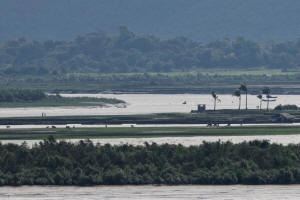Wounded and grieving, Rohingya flee deadly attacks in Myanmar
 Send a link to a friend
Send a link to a friend
 [August 16, 2024]
By Sam Jahan and Mokammel Mridha [August 16, 2024]
By Sam Jahan and Mokammel Mridha
COX'S BAZAR, Bangladesh (Reuters) - Ducking as mortar fire exploded
around them, Rohingya refugee Mustafa Kamal and his family narrowly
escaped the attack by a rebel militia on their town in western Myanmar.
Crowds had gathered on a small island to seek shelter after witnessing
killings in the coastal town of Maungdaw, he said, but "many died on the
spot", including one of his nephews, Noor Sadek.
Others crawled and swam to reach neighboring Bangladesh, he said.
His family are among many Rohingya, members of a persecuted mostly
Muslim minority, who fled Myanmar’s Rakhine state in recent days, as
fighting escalates between the troops of the ruling junta and the Arakan
Army, the powerful ethnic militia that recruits from the Buddhist
majority.
Reuters was not able to determine how many Rohingya had crossed into
Bangladesh, where close to a million Rohingya live in refugee camps
outside the coastal town of Cox’s Bazar.
But medical charity Medicines Sans Frontières said its doctors had
treated 54 people for violence-related injuries in recent days, 40
percent of them women and children.
"We were seeing lots of gunshots, shrapnel, mortar shell injuries, all
indicative of indiscriminate," Orla Murphy, the group's Bangladesh
representative, told Reuters. "They were life-threatening trauma wounds
that we were treating."

The influx of refugees, who will have to stay with relatives, stretching
resources, will make food supplies scarce, said the representative of a
panel of displaced Rohingya.
"They are suffering from an extreme food crisis," added Kamal Hossain,
chairman of the panel. "The government and camp authorities should
arrange their food."
Many dozens of Rohingya, including a heavily pregnant woman and her
two-year-old daughter, were killed last week in drone attacks in
Maungdaw that three witnesses said were carried out by the Arakan Army,
Reuters reported.
The rebel group and the junta blamed one another for the attack. Several
boats carrying refugees to Bangladesh were sunk, killing more,
Bangladesh media said.
The latest wave of attacks, including the burning of a Rohingya town by
the Arakan Army in May, is the biggest surge in violence against the
Rohingya since a 2017 Myanmar military-led campaign that the United
Nations said was carried out with genocidal intent forced more than
730,000 to flee to Bangladesh.

[to top of second column]
|

People of Maungdaw township of Myanmar are seen from the Teknaf area
of Bangladesh, at the Myanmar-Bangladesh border, during the ongoing
conflict in the Rakhine state of Myanmar, in Cox's Bazar,
Bangladesh, June 27, 2024. REUTERS/Mohammad Ponir Hossain/File Photo

'FIGHTING FOR LIFE'
Mohammed Mizanur Rahman, a Bangladesh refugee relief official based
in Cox’s Bazar, said Rohingya had been seeking safety in increased
numbers since the drone attack but did not say how many had crossed
the border.
"I have heard that many dead bodies are floating across to
Bangladesh and a humanitarian crisis has occurred across the shore
in Maungdaw," he said.
Bangladesh is in no position to accept more Rohingya refugees from
Myanmar, the South Asian nation's de-facto foreign minister,
Mohammad Touhid Hossain, told Reuters on Thursday, asking
neighboring India and other countries to do more.
Hossain also called for more international pressure on the Arakan
Army to stop the attacks on the Rohingya in Rakhine state.
"But when someone arrives with a bullet injury, fighting for life,
or a pregnant woman arrives fighting for life, we are not that
inhuman that we will turn them away," Bangladesh's Rahman said.
The United Nations refugee agency, the UNHCR, said it did not have
information on the number of Rohingya who had crossed into
Bangladesh.
Another man who fled his home with his young family, Mohammed Saber,
said about 60 people were killed in his village when the Arakan Army
raided it, among them his two-year-old nephew, Mujibul Hasan.

They paid traffickers to take them by boat to Bangladesh but the
ship came under attack, which killed dozens aboard, he said.
The family is now sheltering with an uncle, but Saber has no money.
He needs to buy medicine for his children.
"I will do whatever it takes to keep my family alive," he said.
(Reporting by Sam Jahan and Mokammel Mridha; Additional reporting by
Devjyot Ghoshal; Writing by Poppy McPherson; Editing by Clarence
Fernandez)
[© 2024 Thomson Reuters. All rights
reserved.]This material
may not be published, broadcast, rewritten or redistributed.
Thompson Reuters is solely responsible for this content. |